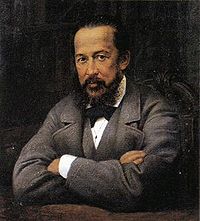
Aleksey Uvarov
Encyclopedia

Uvarov was the son of Count Sergey Uvarov
Sergey Uvarov
Count Sergey Semionovich Uvarov was a Russian classical scholar best remembered as an influential imperial statesman....
, an influential minister of education. He came to know the leading historians of the period, Mikhail Pogodin
Mikhail Pogodin
Mikhail Petrovich Pogodin was a Russian historian and journalist who, jointly with Nikolay Ustryalov, dominated the national historiography between the death of Nikolay Karamzin in 1826 and the rise of Sergey Solovyov in the 1850s. He is best remembered as a staunch proponent of the Normanist...
and Timofey Granovsky
Timofey Granovsky
Timofey Nikolayevich Granovsky was a founder of mediaeval studies in the Russian Empire.Granovsky was born in Oryol, Russia. He studied at the universities of Moscow and Berlin, where he was profoundly influenced by Hegelian ideas of Leopold von Ranke and Friedrich Karl von Savigny...
, from an early age. He was educated at the universities of St. Petersburg, Berlin
Berlin
Berlin is the capital city of Germany and is one of the 16 states of Germany. With a population of 3.45 million people, Berlin is Germany's largest city. It is the second most populous city proper and the seventh most populous urban area in the European Union...
, and Heidelberg
Heidelberg
-Early history:Between 600,000 and 200,000 years ago, "Heidelberg Man" died at nearby Mauer. His jaw bone was discovered in 1907; with scientific dating, his remains were determined to be the earliest evidence of human life in Europe. In the 5th century BC, a Celtic fortress of refuge and place of...
. After his father's death, he commemorated his name by instituting (in 1857) the Uvarov Prize, to be awarded by the Academy of Sciences to distinguished writers and historians.
Uvarov's activities as a field archaeologist began with visits to Rostov
Rostov
Rostov is a town in Yaroslavl Oblast, Russia, one of the oldest in the country and a tourist center of the Golden Ring. It is located on the shores of Lake Nero, northeast of Moscow. Population:...
, Vladimir
Vladimir
Vladimir is a city and the administrative center of Vladimir Oblast, Russia, located on the Klyazma River, to the east of Moscow along the M7 motorway. Population:...
, Chernigov and other centres of Kievan Rus. Starting in 1854, he excavated the Meryan-Norse settlement at Sarskoe Gorodishche. He summarized his findings in The Meryans and Their Lifestyle as Shown by Kurgan
Kurgan
Kurgan is the Turkic term for a tumulus; mound of earth and stones raised over a grave or graves, originating with its use in Soviet archaeology, now widely used for tumuli in the context of Eastern European and Central Asian archaeology....
Excavations. Subsequent expeditions took him to Pontic Olbia, Tauric Chersonesus, and Scythian Neapolis
Scythian Neapolis
Scythian Neapolis was a settlement that existed from the end of the 3rd century BC until the second half of the 3rd century AD. The archeological ruins sit on the outskirts of the present-day Simferopol. This city was the center of the Crimean Scythian tribes, led by Skilurus and Palacus...
.
Uvarov was a towering presence in the history of the Russian Archaeological Society. In 1864 he helped organize the Moscow Archaeological Society, of which he remained president until his death. During Uvarov's administration, the society would convene one time in three years at some ancient Russian town. More importantly in the long run, Uvarov contributed to the establishment of the State Historical Museum
State Historical Museum
The State Historical Museum of Russia is a museum of Russian history wedged between Red Square and Manege Square in Moscow. Its exhibitions range from relics of the prehistoric tribes inhabiting present-day Russia, through priceless artworks acquired by members of the Romanov dynasty...
, with the intention of promoting national self-awareness.
Although his judgement was not always accurate and his methods of research may appear amateurish to a modern observer, Uvarov's work greatly advanced knowledge of pre-Slavic cultures inhabiting the European part of the Russian Empire
Russian Empire
The Russian Empire was a state that existed from 1721 until the Russian Revolution of 1917. It was the successor to the Tsardom of Russia and the predecessor of the Soviet Union...
. Two volumes of Russian Archaeology in the Prehistoric Period contain his delineation of Eastern European prehistory.

